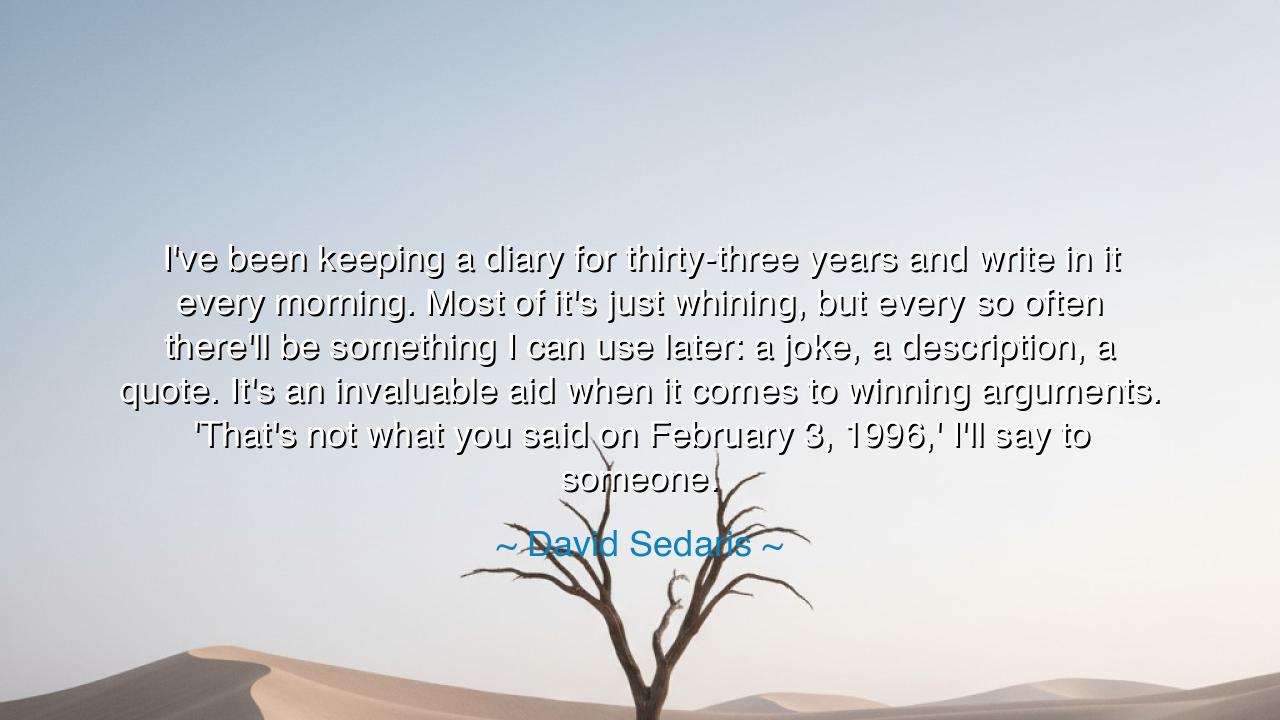
I've been keeping a diary for thirty-three years and write in it
I've been keeping a diary for thirty-three years and write in it every morning. Most of it's just whining, but every so often there'll be something I can use later: a joke, a description, a quote. It's an invaluable aid when it comes to winning arguments. 'That's not what you said on February 3, 1996,' I'll say to someone.






"I've been keeping a diary for thirty-three years and write in it every morning. Most of it's just whining, but every so often there'll be something I can use later: a joke, a description, a quote. It's an invaluable aid when it comes to winning arguments. 'That's not what you said on February 3, 1996,' I'll say to someone." These words by David Sedaris speak to the deeply human need for reflection, memory, and the often hidden treasures of our daily lives. Sedaris' diary is not just a personal record; it becomes a repository of wisdom, a tool for understanding the self, and, occasionally, a weapon for settling disputes. In the act of writing daily, he finds not only catharsis but a means of preserving the truth of moments, a treasure chest of experiences that can later be wielded with humor and precision.
In the ancient world, writing was often considered a sacred act, a way to record the truth and preserve the wisdom of the past. The Sumerians, among the earliest civilizations, recorded their daily lives and important events on clay tablets, believing that the written word could transcend time and communicate truth across generations. Similarly, Greek philosophers like Plato and Aristotle wrote down their thoughts and dialogues, creating works that would serve as foundations for future learning. For them, writing was not merely a personal act but a means to preserve knowledge, share insights, and ensure that wisdom was not lost. Sedaris’ diary follows this ancient tradition, for while it may start with simple complaints, it eventually becomes a tool of reflection, much like the writings of the ancients, holding both personal and universal value.
Consider the great Roman historian Tacitus, whose Annals and Histories have shaped our understanding of the Roman Empire. Tacitus wrote not only to document events but to analyze the motivations and consequences of those events. His work, though filled with political intrigue and moral commentary, is rooted in the belief that history must be recorded—both the trivial and the monumental. In this way, Tacitus' work is akin to Sedaris’ diaries: a compilation of thoughts, observations, and reflections that later take on significance. Just as Tacitus used his writing to draw conclusions about human nature and the course of history, Sedaris uses his journal to capture the nuances of daily life, finding meaning even in the seemingly mundane.
But Sedaris also touches on something that the ancients knew well: the value of writing for self-clarification and self-understanding. Marcus Aurelius, the Roman emperor and Stoic philosopher, kept a personal journal, known today as Meditations. His writings were not meant for publication or public consumption but were a way for him to work through his thoughts, refine his philosophy, and maintain his moral integrity. Aurelius’ journaling was a practice of self-examination, a means to reflect on his actions, his values, and his role in the world. In much the same way, Sedaris uses his diaries to process his thoughts, observing the world and his place within it, but also finding humor and wisdom in the everyday struggles of life. Like the great Stoics, Sedaris understands that writing is not just a means to remember, but a way to reconcile and learn from the past.
The lesson in Sedaris' quote is not just about the value of writing but about the power of documentation in preserving truth. His ability to quote from the past, as in his jest of "That's not what you said on February 3, 1996," is a reminder that, much like the ancients, we must record our truths, our experiences, and our insights, even if only for ourselves. Writing provides a lens through which we can revisit our own journeys and the lessons we’ve learned. In this digital age, where fleeting thoughts often disappear into the ether, Sedaris offers a timeless reminder of the value of personal reflection—of writing down our thoughts, so they do not fade into oblivion.
In our own lives, let us take this lesson to heart. We need not keep a diary in the traditional sense, but there is wisdom in the practice of recording. Whether through journaling, note-taking, or other forms of documentation, we can all benefit from capturing the small moments and big ideas that shape us. Like Sedaris, we can look back at our words and realize that even in our complaints and whining, there may be gems of insight, humor, or wisdom that help us navigate future challenges. Let us embrace the act of reflection, allowing our writing to serve not only as a record of our lives but as a tool for growth and understanding.
Thus, let us take up the ancient practice of writing with purpose, knowing that through our words, we may gain greater clarity and insight into who we are and what we believe. Just as the ancient philosophers and historians documented their thoughts for posterity, we too can use writing as a tool to chart our own personal evolution, recognizing that even the smallest observations can illuminate the truths of our lives. In the end, as Sedaris suggests, the act of writing helps us connect the dots between the seemingly insignificant moments and the greater narrative of our lives, and in doing so, we may come to see the value in all that we record.






AAdministratorAdministrator
Welcome, honored guests. Please leave a comment, we will respond soon